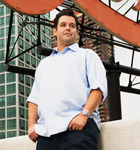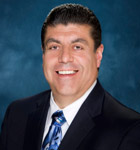The sixth child of nine siblings by Mexican immigrant parents, Art Marquez grew up in the small town of Commerce outside of Los Angeles never thinking he would be jet-setting with celebrities one day. “We didn’t have much, but my dad worked hard and my mom was a good household manager, so we never wanted for any necessities,” Marquez says. “But, the best gift I received from my parents was a desire to succeed.”
And that desire has been more than realized. As the current senior vice president of affiliate sales and marketing for Pac-12 Enterprises, Marquez heads the affiliate sales and marketing team for his third major-cable network start-up, a position he has held since January 2012. Marquez dishes on what it takes to succeed in the super-competitive sports-industry arena, the importance of knowing when to jump, and making multimillion-dollar deals.
Did you want to be involved in the sports field when you were young?
Actually, no—I was more interested in politics. In high school, I was student body president, and the student liaison to the school board. I chose to major in political science in college, and spent several years working on campaigns for local Hispanic candidates. In 1984, I became the youngest city council member in the state of California when I was appointed to serve on the Commerce city council.

Sounds like you had a successful career started. How did you make the jump to the sports industry?
Having grown up outside Los Angeles, the lure of Hollywood was always present. I really wanted to work in the broadcasting field, but at the time, it was not an easy field to break into as a minority. My college adviser also told me I needed to learn the sales process with people, so I took a job working with the local Cook Ford dealership in sales and, from there, was hired by Cencom Cable. Later, I held positions with CNBC, Univision, NBC Cable, and, in 2003, accepted a position to help launch the NFL [National Football League] Network.
So the NFL was your first start-up venture?
Yes, though, at the time, I knew very little about American football, but I knew everything about the cable industry so I was confident I could be successful in the role. I was with the NFL Network for five seasons, and then I was offered a job with the MLB Network, another start-up venture, where I worked until I came to the Pac-12.
What attracted you to Pac-12?
Well, I wasn’t really looking to leave MLB, but a headhunter contacted me about the position and, with two launches under my belt, it seemed like the time to move onto the next big launch. I liked the energy of the Pac-12 executive team and, of course, the NFL and MLB are league-based sports whereas Pac-12 is a conference and, I feel, the next generation of cable. We have some really unique plans, from regionalized, school-specific broadcasts to all-inclusive access to the network.
How has the cable industry changed over the years?
The industry has changed a lot. The number of multisystem operators, or MSOs, has shrunk over time through consolidations, which has made it more challenging. Affordable rates are a big issue right now, but I am always able to find a way to work out something that benefits the client and the network.
What are your philosophies on partnering successfully with clients?
My clients know I have credibility—I never lie to them. If I make a mistake, I live up to it and work through it, being honest and up-front. I also immerse myself in what I do. I study my company, my client’s company, and then I figure out how I can help them. Once I make the sale, I become their partner.
Having just started your role with Pac-12, how are you building your team?
By hiring people that are smarter than me. I can teach someone all they need to know about the cable-network business, but I want to surround myself with people knowledgeable in sports so I can, in turn, learn from them.
What advice would you share with up-and-coming professionals in this field?
This field can be very glamorous, too—you’re invited to parties with celebrities and flashy events—but I caution new hires not to become so enamored with the glitz that they lose their focus. Lastly, it’s important to enjoy what you do because if you don’t, it will come across to your clients.
How has the field changed for minorities?
I have definitely seen more doors open for people. I was very lucky, in my personal experience, to work with companies who looked beyond skin color to recruit great people. The challenge is that once the door is opened, you have to work hard, be a team player, and your skin color will not matter because you are simply a part of the team.
What specific advice do you have for young Latinos in the sports industry?
First impressions are very important—you only have a few minutes to sell your product, so you have to always be at the top of your game. It’s not about knowing sports, it’s about proving your worth and demonstrating a dedication that shows you will do what it takes to get the job done.

